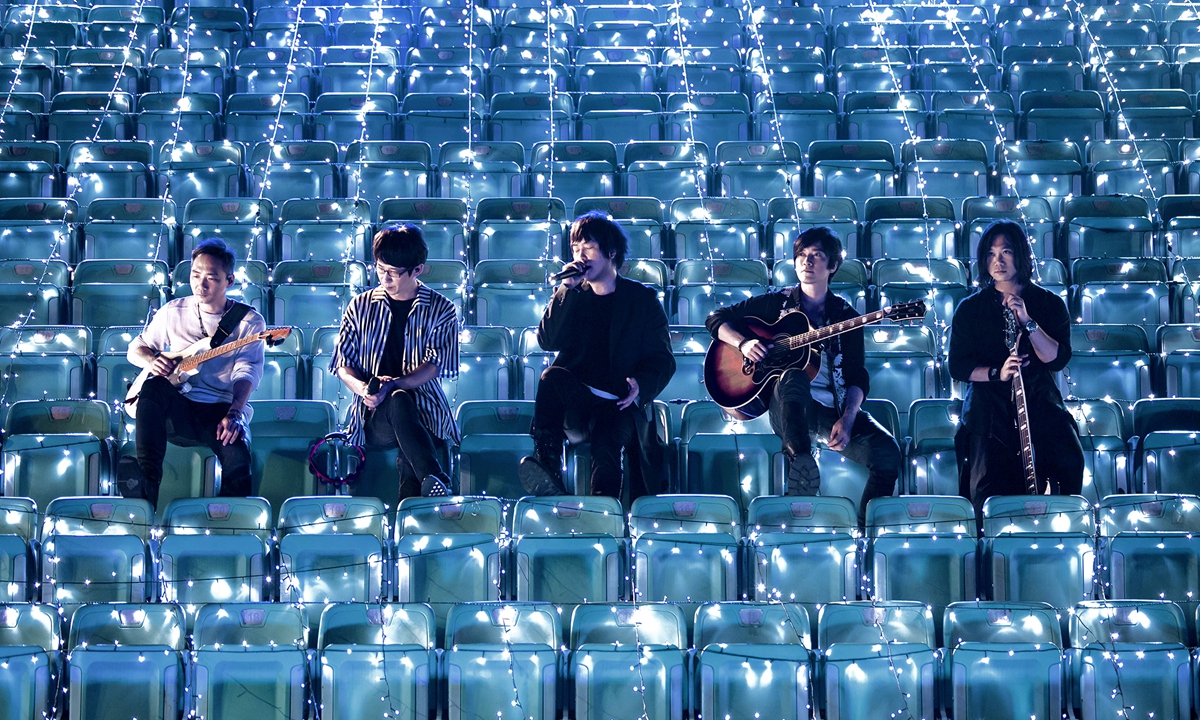
Chinese band Mayday based on the island of Taiwan livestream a concert Photo: Courtesy of TME Live A girl is jogging with a mask. A waitress showcases the serving chopsticks in East China's Jiangsu Province. A newly wedded couple showcase their marriage certificates. Photos: IC, VCG
Ticket scalping in China's performance market has emerged again after the economy picked up quickly with the optimization of COVID-19 management. In a recent campaign against ticket scalpers launched in Beijing, which runs from April to June, 20 scalpers have so far been apprehended.
Statistics from the China Association of Performing Arts showed that 31,100 commercial performances were held nationwide during the recent May Day holidays, with box office revenue of 1.51 billion yuan ($218 million) and attendance of about 8.65 million.
During the first quarter, a total of 8,982 commercial performances with 1.87 million attendees were held in Beijing, with box office revenue of 325 million yuan.
Nearly 300,000 tickets for six concerts set to be held at Beijing's National Stadium from mid-May to early June by Mandopop band Mayday from the island of Taiwan were sold out within five seconds last Tuesday, stirring a suspicion of scalping activity. Even a new type of glow stick designed for the concert drew 42,000 orders for a total of 5.88 million yuan.
However, ticket scalping emerged simultaneously and disrupted the order of the commercial performance market, harmed the consumer rights and interests of the audience, and damaged the good reputation of the performance market in the capital city.
To tackle the scalping chaos, local authorities in Beijing - including the cultural and tourism departments, internet and information technology supervisors, the public security department, the cultural law enforcement department and the market watchdog - formed a special work group to jointly carry out rectification under eight measures, according to a report by the China Central Television on Sunday.
The work group is managing the origin of the tickets, making sales open to the public. It also regulates the sales of tickets using a real-name system and limits the number of tickets each consumer can buy for a single performance.
The work group also strictly cracked down on ticket scalpers and illegal ticket sales on online platforms.
One of the major measures of the rectification is to inspect scalpers on the scene at hit shows and large-scale performances.
On April 29 and May 13 ahead of the concerts of Chinese singers Han Hong and Richie Jen, 20 scalpers were apprehended with the joint efforts of related departments, which served as a powerful deterrent to criminals.
The authorities closely monitored, restricted and cracked down on the illegal resale of secondhand tickets of popular performances at high prices on online trading platforms. An online ticketing platform that "sold performance tickets without authorization of the performance organizer" was investigated.
The rectification has begun to show an effect, with almost no scalpers seen around the venues of hit shows.
The rectification efforts will continue to crack down on ticket scalping related to popular performances with joint efforts of multiple departments.
China's Ministry of Culture and Tourism issued a notice on April 26 to strengthen and regulate the management of the performance market, urging the culture and tourism departments to crack down on ticket scalping according to laws to protect the legitimate rights and interests of consumers.
Apart from the scalpers caught in Beijing, two scalpers who moved from place to place were apprehended in Ledong county, South China's Hainan Province on April 24. They were placed under administrative detention for 15 days and fined 1,000 yuan.
Global Times




